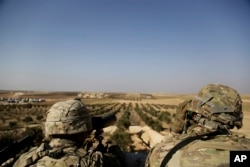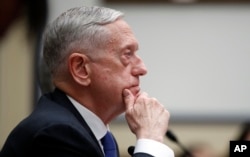Two coalition special forces soldiers killed near Manbij, Syria were on a “kill or capture” mission for a high-value operative from the Islamic State terror group.
U.S. Army Master Sergeant Jonathan Dunbar and British Sergeant Matt Tonroe died after they were hit by an improvised explosive device Thursday, March 29.
The U.S. military initially had said only that the attack took place while Dunbar, Tonroe and other coalition forces were involved in a combat operation. But the coalition confirmed Monday that the two special forces soldiers were going after a high profile IS operative.
“Coalition forces, in an advise, assist and accompany capacity with our partners, were conducting a mission to kill or capture a known ISIS member when they were struck by an improvised explosive device,” said Operation Inherent Resolve spokesman, Col. Ryan Dillon, using an acronym for the terror group.
“We know ISIS has gone into hiding and are attempting to regroup and reorganize,” Dillon said. “We are supporting our partners to eliminate ISIS remnants throughout Iraq and Syria.”
The coalition did not say whether the mission had been successful, or whether it was completed. It also would not say which group it believed was responsible for the IED attack.
IS fighters in hiding
Coalition officials estimate IS has lost approximately 98 percent of the territory it once controlled in Iraq and Syria at the height of the terror group's self-declared caliphate.
Still, the U.S. estimates as many as 1,000 to 3,000 IS fighters remain active in Syria and Iraq, many hiding in pockets in the Middle Euphrates River Valley, which extends from Raqqa, Syria, to the Iraq border.
And while much of the terror group’s senior leadership has been killed over the past few years, new leaders have risen to take their place. Coalition forces have also yet to determine the fate of the group’s self-declared caliph, Abu Bakr al-Baghdadi, who is thought to be in hiding, possibly in Syria.
Manbij, the location of the coalition’s capture or kill mission, also has been a source of tension between the U.S. and Turkey.
US troops stationed in Syria
Turkish officials have threatened to move into the Manbij area as part of their military campaign in Syria against Kurdish forces aligned with the PKK terror group.
The U.S. has about 2,000 troops in Syria, some stationed in Manbij, where they have been working with the largely Kurdish Syrian Democratic Forces to eradicate IS.
Turkey says some of the Kurdish forces are connected to the PKK, a charge the U.S. denies.
Last week, the U.S. began moving additional special operations forces into the Manbij area as part of an effort to better protect U.S. forces in the area.
Turkey sits tights
So far, though, Turkey has not made good on its threats to enter Manbij.
“There has been no move against Manbij,” U.S. Defense Secretary Jim Mattis told reporters at the Pentagon last week. “We continue our dialogue with the Turkish authorities about how do we sort this out.”
Mattis and other top U.S. officials have criticized Turkey's military campaign in northern Syria, saying it has distracted from anti-IS efforts.
“We are no longer in an offensive effort on the ground against them as this has drawn off the attention,” Mattis said.






